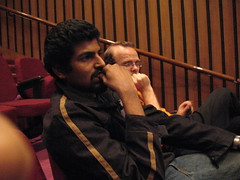For the past weekend, I've been roaming the corridors of FOSS.in. I've never attended a talk about something I could figure out for myself, but still there were four talks which I sat through - a grand achievement, compared to the meager two talks last year.
But I wasn't in Bangalore for most of last week. I'd gone home to tie up some loose ends and cleanup my act before I dived into the conference. I reached back in Bangalore only early morning of Thursday, just in time to catch up to some sleep. I took a preliminary peek at the venue on thursday itself. The place was hum of activity with the volunteers stuffing delegate kits, falling lampshades and power mayhem.
And then on friday, it all began. As I watched the lines for registration grow, I noticed a general paucity of the number of delegates this year. Since the conference was on a weekend, I had hoped for more students in the crowd, but that was not to be (as far as I could make out). But thanks to the weekend, there was a larger crowd from outside Bangalore and that's always a good thing.
Since I was a care-free delegate, I had planned to do a security BoF at the conference. But when that didn't quite materialize, I gave up on the idea. Backporting a dbus-send shared connection patch was trivial, but was wasted because we couldn't get beryl to flip the windows for the projector display. Except for that random hack, I didn't touch a single line of code during the conference.
The inaugural keynote was by Suparna Bhattacharya, a kernel developer from IBM. As much a fan I'm of minimalistic development, I skipped out early to find a decent cup of coffee instead. My abominable behavior notwithstanding, it is a proud day for the Indian FOSS community to have an Indian on the podium, for a change.
And then I ran into a surprise. One of the dotgnu libjit developers, krokas, had flown in to India and met me in one of the corridors. Even though I'm not a great fan of his business ideas on professional opensource, it was nice to actually meet one of your fellow developers face to face. Met a couple of people from Microsoft too, discussed a bit of C#/.NET technical quirks (GC-able assemblies), dodged the "what'll it take to get you to work at Microsoft" question and kept wading through the crowds.
One of the talks I actually attended, by Andrew Cowie touched up on a few problems the ubquity of mono brings along, especially considering the latest Novell developments. Initially voiced by Seth Nickell, I find it is a valid concern. For instance, I've never suggested dotgnu to anyone who's wanted to write an application from scratch. Anyway, that talk covered all the normal obstacles that developers place in the way of external contributors and in general was interesting enough to keep me from wandering out.
Another one of the talks I dropped into was Get Rich with Php5 talk by Rasmus. I knew from the slides that it featured my work for the last year - APC. But the content of the talk was still interesting, especially the benchmark numbers for each increment.
The BoF tents looked more interesting than last year. But the initial lack of chairs killed a bit of the enthusiasm. Also moving the FOSS Expo area out of the main lobby area made it almost pointless. Before long we had converted the project expo into a live demo for ioquake3 - sweet GPL love from Id. Though Dalfry ruled the roost for the first fragfest, I eventually climbed the levels due to the basic advantage of knowing the maps by heart.
The other couple of talks I dropped into were the panel discussions about 10 years of Linux India and spo0nman's monitoring with nagios talks. The panel discussion was slightly boring, mainly because the panel wasn't split on most of the issues and the crowd lacked the trolls required to make the discussion interesting. And the only question I held in my hands was about the history of PCQLinux, without which half the FOSS folks in India today wouldn't have ever used it - probably the action of greatest consequence in the last 10 years of FOSS in India. But that was skimmed over with a passing reference.
And then there was the cool stuff left - the jokes, the corridor conversations, the conclusions and the arguments. I'll let a few pictures speak for themselves. And maybe this video (mp4, 12.1 Mb).
But let me calm some fears expressed in the discussions. The growth of FOSS in India has been fairly organic for the hobbyist category, while the explosion of user mass worldwide has pulled up the number of programmers getting paid to write FOSS. The community entries in this game has still retained single digit significance in the last year as it has for the past years - but that is not something to get alarmed about, because we've now got employees contributing to FOSS. Things could be a little better - but that's always the case.
All in all, a good conference. But I've got more plans for next year. Rather than mere BoFs, we should be able to run a mini-conf in the middle of a conference with the speakers present. I suspect that it might be possible with a bit of fine-tuning in the event in real time, rather than organizing a whole parallel set of talks. But next year is nearly a year away ;)
--People who go to conferences to talk are the ones who shouldn't.
posted at: 04:12 | path: /conferences | permalink |





















